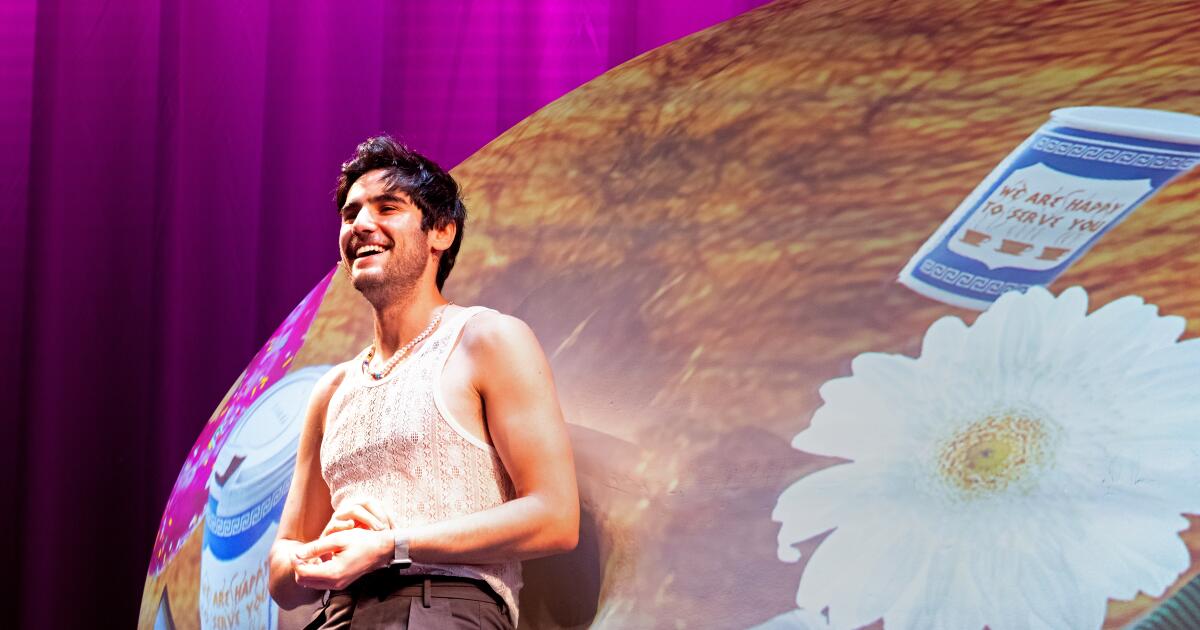In “Sugar Daddy,” comedian Sam Morrison sets out to convert tragedy into stand-up comedy. A form of self-therapy, the show (at the Wallis through Oct. 13) recounts the story of how he met the “daddy” of his dreams, only to lose him a few years later to COVID.
Morrison wasn’t necessarily looking for long-term romance when he traveled to the gay mecca of Provincetown for the Spooky Bear festival. He was certainly eager to meet men, preferably older, with large bellies and generous dispositions. But young, handsome and on vacation, he was raring to sample the menu.
“I’m a diabetic,” he explains at the top of the show. “My type is Type 1 but my type is Type 2.” He doesn’t mind if you label him a “chubby chaser,” but he’ll call you a “golden retriever” for being turned on by bones.
The production, directed by Stephen Brackett, who was nominated for a Tony for his staging of “A Strange Loop,” features an egg-like object on Arnulfo Maldonado’s set. This odd-shaped sculpture transforms through Alex Basco Koch’s video design into a massive hairy belly that Morrison rubs affectionately. He likes what he likes, and if you think his taste is weird, he finds conventional heterosexuality to be even weirder.
His meet-cute with Jonathan is assisted by a Category 3 hurricane. Morrison was staying in a hammock on a campground that was good for an orgy but not ideal for a natural disaster. He needed shelter, which meant that he needed to find a hook-up before the bars closed.
Surely there must be a lonely bear willing to rescue a 20-something fetishist in distress. But before Morrison knew it, the clubs had closed and he was stranded under a metal awning at a pizzeria in a state of growing panic. “I’m an anxious, asthmatic, ADHD, gay, diabetic Jew,” he shrieks, repeating the list so that the audience can register the gravity of the situation.
Salvation comes when a man slams into him. Morrison was about to scream but changes his mind when he saw how good-looking the guy was. “You’re the hottest daddy in Ptown,” he said with a drunken effusiveness that earned him an invitation to a tiny Airbnb.
Nora Ephron probably wouldn’t haven’t been tempted to turn this story into a rom-com. The transactional nature of the affair isn’t especially heartwarming. The words “old” and “fat,” while spoken lustfully by Morrison in his setup, reflect a pattern of mind that reduces gay people to physical and sexual stereotypes. Morrison, who punctuates lines with the exclamation “slay!,” sounds at times like Grindr sprung to life.
Despite their many differences, the two men start dating in New York. Jonathan worships Liza while Morrison idolizes Lizzo, but they both love to laugh and have sex, and what more does a couple need?
When Jonathan suggests that Morrison move into his apartment, Morrison gets cold feet. But a few months later, after COVID upended the world, they decided to quarantine at Morrison’s grandmother’s house in Rockland County, N.Y. Hiding out with his older lover at his grandmother’s during a global crisis seems like a ripe opportunity for comedy, but Morrison doesn’t give us many details other than that they developed their own affectionate form of nonsense talk.
As tensions arose a few months into their confinement, they took off for a now eerily empty Provincetown. The exact chronology of events is blurred by the way Morrison jumps around in time, but when Jonathan tests positive for COVID, no one suspects that in two weeks he’ll be on a ventilator.
“Sugar Daddy” does something that I haven’t seen much despite the extraordinary number of COVID deaths. It makes a record of one person’s sudden loss.
Jonathan is lovingly remembered, though his portrait is only sketched. Morrison misses his late partner’s gigantic belly laugh that would engulf everything in its orbit. The first time he heard it, Morrison assumed that Jonathan was on Molly, but he was just naturally high on humor.
Morrison’s observations of Jonathan take the form of quips. We’re told that Jonathan liked to order “no less than 400 appetizers for the table” when out with friends and that he left a generous mound of ashes that was easily divided by loved ones. Not wanting to be maudlin, Morrison sometimes comes off as shallow.
He is determined to stay true to his stand-up calling. Everything is fair game for laughs, including his glucose monitor, which in an interesting twist turns out to be a legacy of his relationship (and the unexpected meaning behind the show’s title).
There’s talk of “Sugar Daddy” moving to Broadway. The show is presented by some high-powered names, including Alan Cumming and Billy Porter. But comedy is subjective: What one person may find a laugh riot, another may dismiss as grating attention-seeking.
A self-described “millennial comedian,” Morrison doesn’t strike me as the cleverest crafter of jokes. He doesn’t have Hannah Gadsby’s verbal finesse, Alex Edelman’s zeitgeist radar or Mike Birbiglia’s off-beat wryness.
The strained delivery of punchlines made me wonder if Morrison had honed his stand-up act in noisy gay clubs over drink orders. I’m touched by his story and applaud his resilience, but “Sugar Daddy” didn’t provoke many memorable belly laughs from this sympathetic critic.

